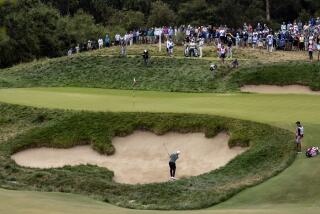Augusta Is Going to Greater Lengths
For the second time in three years, Augusta National Golf Club is getting a makeover, with six holes being lengthened a total of 155 yards for the 2006 Masters.
Four par-four holes, including the first hole and No. 11, the beginning of Amen Corner, are getting stretched out. The par-three fourth hole is getting 30-35 yards longer, to 240 yards, and the par-five 15th is being stretched another 25-30 yards to 530 yards.
The par-four seventh tee, which is being moved back 35-40 yards to make the hole play about 450, is some 85 yards longer than it was in 2002 when the hole was one of nine that were altered in the most sweeping course changes in Masters history and some 285 yards added.
The first hole, which was made 25 yards longer in 2002, is getting an additional 15-20 yards, a move that pushes the tee so far back that some of the putting green will be eliminated. Also, trees will be added to the left side of the fairway.
On the back side, the 11th will be lengthened 10-15 yards to approximately 505 yards and trees will be added to the right side of the fairway. Plus, the fairway will be shifted to the left. Besides the added yardage at the 15th, the tee will be moved about 20 yards to the left. The 17th is getting another 10-15 yards and will play at about 440 yards.
When the changes are completed by the time the club opens in October, Augusta National will measure about 7,445 yards. In the 2001 Masters, before the previous changes, it was 6,985.
Tom Fazio, who oversaw the 2002 alterations, is the course architect in charge of the project.
In a statement announcing the changes, club Chairman Hootie Johnson said they were made so the course could stand up to modern players.
“Since the first Masters in 1934, this golf course has evolved and that process continues today,” Johnson said. “As in the past, our objective is to maintain the integrity and shot values of the golf course as envisioned by Bobby Jones and Alister MacKenzie. Players’ scores are not a factor. We will keep the golf course current with the times.”
Tiger Woods won in April with a 72-hole score of 12-under --par 276, beating Chris DiMarco in a playoff. Retief Goosen and Luke Donald tied for third at five under. Nineteen players shot par or better.
On the last day, Woods, DiMarco and Goosen birdied the 15th hole and Donald eagled it.
The revamped 530-yard 15th, the last of the four par fives on the course, has proven to be the least difficult hole in Masters history, according to statistics kept by the club. It was also the 485-yard hole where Gene Sarazen made a double eagle in the 1935 Masters -- but that was 45 yards and 70 years ago.
*
(BEGIN TEXT OF INFOBOX)
Playing Long
The seven longest courses in major championship history, after the proposed changes announced Tuesday by Augusta National for next year’s Masters:
1. Whistling Straits
2004 PGA Championship 7,514 yards
2. Augusta
2006 Masters 7,445 yards
3. Columbine
1967 PGA Championship 7,436 yards
4. Medinah
1999 PGA Championship 7,401 yards
5. Carnoustie
1999 British Open 7,361 yards
6. Hazeltine
2002 PGA Championship 7,360 yards
7. Crooked Stick
1991 PGA Championship 7,295 yards
Source: Reuters
More to Read
Go beyond the scoreboard
Get the latest on L.A.'s teams in the daily Sports Report newsletter.
You may occasionally receive promotional content from the Los Angeles Times.










